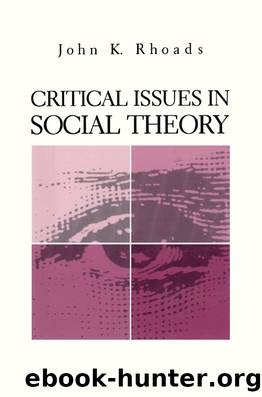Critical Issues in Social Theory by John Kenneth Rhoads

Author:John Kenneth Rhoads [Rhoads, John Kenneth]
Language: eng
Format: epub
Tags: Social Science, Essays, Sociology, Urban, General, Philosophy, Criticism
ISBN: 9780271072456
Google: QspWCgAAQBAJ
Publisher: Penn State Press
Published: 1991-04-23T03:52:58+00:00
Benthamâs Theory of Order
Jeremy Bentham (1748â1832), the leader of the utilitarian thinkers, explored the role of self-interest under the notion of utility. Although his thinking ramified in many directions, his primary concern was the relation between the principle of utility and law.
Bentham believed that in the uniform effects of pleasure and pain he had discovered consequences comparable to the laws of nature. He began his first great work with these words:
Nature has placed mankind under the governance of two sovereign masters, pain and pleasure. It is for them alone to point out what we ought to do, as well as to determine what we shall do. On the one hand the standard of right and wrong, on the other the chain of causes and effects, are fastened to their throne. They govern us in all we do, in all we say, in all we think . . .25
Immediately after identifying the pursuit of pleasure and avoidance of pain as the wellsprings of action, Bentham translated these terms into happiness and unhappiness. Thus, the dominant tendencies in human action are the augmentation of happiness and the reduction of its opposite.26 Although some do it with less exactitude than others, everyone calculates in order to augment his happiness.27
These propositions yield the famous principle of utility, which, according to Bentham, meant basically two ideas: (1) the recognition of the role of happiness in action, (2) the adoption of happiness as a criterion for the evaluation of action. With regard to the second, any action that increases to the fullest extent possible the happiness of all those whose interests are affected by it, including that of the actor himself, is positively regarded in the light of the principle of utility.28 Later on, Bentham restated the principle in the light of the above to mean the greatest happiness for the greatest number.
Bentham therefore believed that the principle of utility not only reveals the causes of human action but also functions as the universal criterion of morality. For him the matter was obvious. Happiness is the only good, pain the only evil. And since every action is motivated to make the actor happy, no motive is intrinsically bad. It follows that insofar as an action actually brings about unhappiness, either to the individual himself or others, the action is evil, despite the fact that, at the same time, the motive behind the action is good. Consequently, the moral worth of an act has to be judged strictly in terms of its effects.29 The principle of utility is therefore a moral rule, which everyone, whether or not he recognizes it, employs as a standard of evaluation.30 Bentham thus elevated the âisâ of a law of human nature into the âoughtâ of a moral rule.
If utility is indeed a law of human nature, it ought to be possible to measure the quantities of various pleasures and pains and calculate their net balance. Benthamâs positivism sought to carry over the precision of natural science to the science of human affairs.
Download
This site does not store any files on its server. We only index and link to content provided by other sites. Please contact the content providers to delete copyright contents if any and email us, we'll remove relevant links or contents immediately.
Spell It Out by David Crystal(36117)
Life for Me Ain't Been No Crystal Stair by Susan Sheehan(35811)
Cecilia; Or, Memoirs of an Heiress — Volume 1 by Fanny Burney(32558)
The Great Music City by Andrea Baker(32019)
Cecilia; Or, Memoirs of an Heiress — Volume 2 by Fanny Burney(31956)
Cecilia; Or, Memoirs of an Heiress — Volume 3 by Fanny Burney(31942)
Professional Troublemaker by Luvvie Ajayi Jones(29663)
The Secret History by Donna Tartt(19090)
We're Going to Need More Wine by Gabrielle Union(19046)
Twilight of the Idols With the Antichrist and Ecce Homo by Friedrich Nietzsche(18633)
All the Missing Girls by Megan Miranda(16029)
Cat's cradle by Kurt Vonnegut(15357)
Pimp by Iceberg Slim(14508)
For the Love of Europe by Rick Steves(14121)
Bombshells: Glamour Girls of a Lifetime by Sullivan Steve(14076)
Talking to Strangers by Malcolm Gladwell(13370)
Norse Mythology by Gaiman Neil(13365)
Fifty Shades Freed by E L James(13241)
The Social Justice Warrior Handbook by Lisa De Pasquale(12190)
